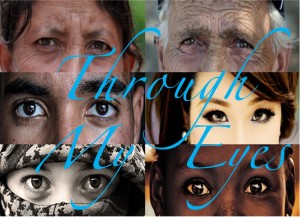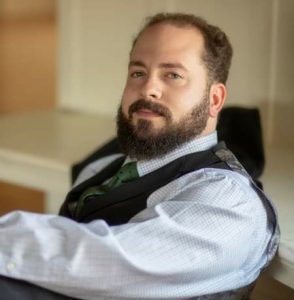The following is a first-person reflection from a member of a Presbyterian Church (U.S.A.) congregation in the Synod of the Trinity region. During this time when the pandemics of both the coronavirus and our culture of racism cannot be ignored, this series titled “Through My Eyes” allows for those in the Synod’s bounds to share openly what they are experiencing on a regular basis. This is not meant to be a political forum, but instead a chance for people to express their personal feelings about what they are seeing and feeling during this unique time. If you have something to share, email Synod Communications Coordinator Mike Givler (mgivler@syntrinity.org) and your reflection will be considered for use in this series.
ABOUT THE AUTHOR: Rev. Adam M. Demetros is the pastor of Wyoming Valley Presbyterian Church in Wilkes-Barre, PA. While serving a diverse community during a time of heightened anxiety, he has found that the words of theologian Dietrich Bonhoeffer ring true: “The person who loves their dream of community will destroy community, but the person who loves those around them will create community.”
 Having spina bifida essentially means that my spine is out of place, which is fitting because that’s often how I feel. I regularly encounter parking lots that are far too large to traverse, high shelves and cabinets that are just out of reach, and clothing that never really fits as it should. As a result, I rarely feel at ease or untroubled because the world in which I live is an endless series of challenges that need to be overcome. However, I would say that the only real disability of Spina Bifida is the fatigue that comes from having to constantly jump through hoops just to be on the same playing field as everyone else.
Having spina bifida essentially means that my spine is out of place, which is fitting because that’s often how I feel. I regularly encounter parking lots that are far too large to traverse, high shelves and cabinets that are just out of reach, and clothing that never really fits as it should. As a result, I rarely feel at ease or untroubled because the world in which I live is an endless series of challenges that need to be overcome. However, I would say that the only real disability of Spina Bifida is the fatigue that comes from having to constantly jump through hoops just to be on the same playing field as everyone else.
Given the difficulties of our world today, I think that we have all been jumping through hoops for quite some time and it is clearly starting to wear on us.
In a time of pandemic restrictions, political divide and racial tension, it’s apparent that everyone is starting to feel fatigued. For instance, going out to eat at the end of a long day is no longer a simple task. Plans need to be made well in advance. Research needs to be done about seating capacity and dine-in or dine-out options. Limited menus need to be checked for dietary restrictions. And if the necessary information is not forthcoming, then phone calls need to be made. And all of this needs to be done before you even leave the house!
Then of course there is your health and personal safety to deal with. Is your workplace clean? Do you have enough hand sanitizer and cleaning supplies? How about toilet paper? How many times have you touched your face today? Did you remember to bring your mask? How are you going to maintain social distance in the grocery store? Should you even go into the grocery store? And if you have been exposed to the virus, exactly how many days do you need to quarantine and are you prepared for that? And on top of all of that there are your regular responsibilities that haven’t slowed down even if the rest of the world has.
Is the fatigue starting to set in yet? Are you beginning to feel out of place?
In addition to everything else, this is an election year that has the potential to turn friends into strangers, and strangers into enemies. As a result, we have developed a deep-seeded mistrust of those around us. We have created dividing walls that inhibit our ability to carry each other’s burdens. Instead of addressing the struggles that we as a community are facing, we focus on the pain that divides us. And instead of helping others find ways around their challenges, we place more obstacles in their path. In other words, we are creating our own limitations because we have damaged the body of Christ.
Why do we do this? Life is hard enough, and life during a pandemic is even harder. The last thing we need to do is divide the body of Christ, because it is only in Christ that we are made whole and find a common identity.
Every now and then someone will work up enough courage to ask what’s “wrong” with me as they struggle to find the least offensive word to describe me. They ask, “Should I call you disabled, dis-Abled, otherwise abled, handicapped, handi-capable, or other capable?” And I always respond, “I prefer you call me Adam.”
Likewise, we are having a hard time finding appropriate ways of addressing our fellow brothers and sisters in Christ. Do we call them black, white, conservative, liberal, Republican, Democrat, American, foreign, healthy or infected? And there is no shortage of rhetoric being used to pin-point exactly what we think is “wrong” with others. We assume that if they don’t act like us, walk like us, talk like us, quarantine like us, or vote like us, then there must be something wrong with them. When in reality we are only projecting our own anxiety onto others because we are so overwhelmed with fear that it is just spilling out of us.
All of this has continued for days that bled into weeks, and weeks that bled into months and it does not look like it is going to end anytime soon. So, let me ask you:
Is the fatigue starting to set in yet? Are you beginning to feel out of place?
The good news of the Gospel is that each of us have a place in the body of Christ. And it is in Christ that we find rest for our weary souls. But remember, for many of your disabled brothers and sisters, we always feel fatigued and out of place.

